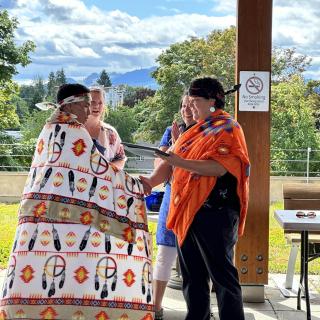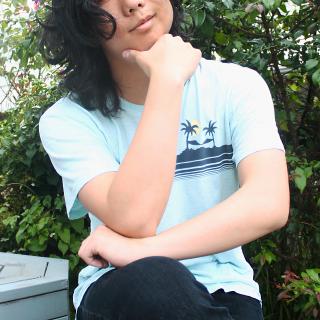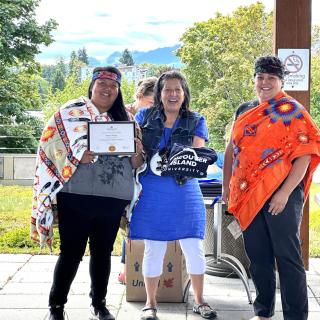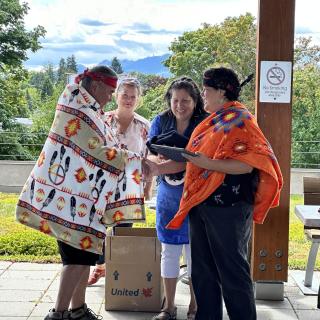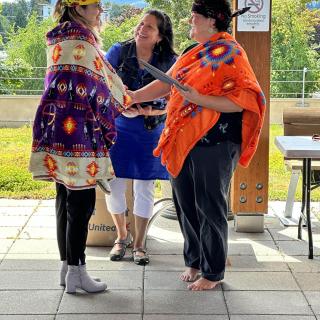This piece was co-created by many hands. Authorship was led by Heather Burke, Learning Facilitator, Vancouver Island University, Cheyenne Williams, Contractor, Lulumexun (Cowichan Tribes Lands and Self Governance), and Maureen Thomas, Community Engagement Manager, Vancouver Island University.
Quw’utsun Hwulmuhw Mustimuhw are reclaiming their inherent rights and responsibilities to care for the lands and waters within their territory, including the health of the Xwulqw’selu (Koksilah) Watershed. Cheyenne Williams is a young advocate and leader in her community who is passionate about protecting the watershed. Cheyenne is a member of Cowichan Tribes and has ties to Ka:'yu:'k't'h' (Kyuquot) in Nuu-Chah-Nulth territory as well as colonial-settler ancestry from England, Ireland, Scotland and Wales. Cheyenne is a contractor for Lulumexun (Cowichan Tribes Lands and Self Governance department), and the energetic force behind a collective vision to establish a Xwulqw’selu Riparian Guardians program. The decision to investigate the program is an outcome of the Cowichan Tribes and Province of BC Scoping Steering Committee, a group tasked with forming a government-to-government relationship. The group focused on Xwulqw’selu Watershed sustainability planning initiatives.
The vision for the new Xwulqw’selu Riparian Guardians program is to see Quw’utsun Mustimuhw “return to traditional stewardship and management practices that draw from [ancient] snuw’uy’ulh (teachings)” (Cheyenne Williams, July 27, 2023).
To train future Riparian Guardians, Vancouver Island University partnered with Cowichan Tribes to deliver a nine-week Quw’utsun Environmental Technicians Certificate program. The program was delivered in Quw’utsun territory and tailored to meet Quw’utsun needs with cultural support present throughout the training.
Tuition, supplies and a living allowance were provided by Quw’utsun Employment and Training, and through the Indigenous Watersheds Initiative, a grant provided by the Make Way Foundation. The program provided introductory monitoring skills, including land, water, fish and fish habitat, and construction site monitoring.
Training needs specific to Quw’utsun territory included SWIFT water rescue training and basic first aid. The class sat in weekly talking circles with VIU Cowichan Elder-in-Residence Marlene Rice and had welcoming and closing support from Maureen Thomas, VIU Community Engagement Manager and Knowledge Keeper Brian Elliot,. Students also spent time and learned with knowledge holders and guest speakers in the classroom and on the land, including huľqumíʼnum language instructor, Roberta Charlie, Associate Professor, Faculty of Law, University of Victoria Sarah Morales, Natural Resource Consultant, Cowichan Tribes Lands and Self-Governance Department, Tim Kulchyski, Ethno-botanist and Elder, Ken Elliott and cultural worker and archaeology consultant, Harold Joe. At the completion event, students celebrated with family and friends, shared a feast, enjoyed entertainment from Tzinquaw dancers, and each graduate was blanketed to honour and acknowledge their achievements.
Learning on the land
The Quw’utsun Environmental Technicians certificate is one of many different programs co-delivered between Indigenous communities, VIU, other partners and even other post-secondary institutions. The term “relational land-based learning” is used to describe the unique responsiveness of the programming and its natural evolution toward co-creation. Programming takes place in Indigenous communities and attempts to flip the typical post-secondary learning model on its head through deep listening and engagement around how programming will align with the emerging goals and/or priorities of the community and the youth. For example, the recently signed Xwulqw'selu Watershed Planning Agreement, a continuation of the Scoping Steering Committee work mentioned above, “is informed by 11 Quw’utsun snuw’uy’ulh (teachings)” (Quw’utsun Newsletter, June 21, 2023) and has implications for the learners in terms of their potential future as Xwulqw’selu Riparian Guardians.
Relational land-based learning programs are co-designed to ensure Indigenous Knowledges are handed down to the next generation. Quw’utsun Mustimuhw have been stewarding their lands since time immemorial. These teachings and practices are held in conjunction with western academics and can help to deepen students’ sense of place, tradition and sacredness. Though many promising practices are emerging from work done in co-creating relational land-based learning programs, further systems changes are required. When I spoke to students, they stressed more local teachings could have been implemented into the delivery because they “prepare us for all the work ahead with all the components of being ready to work. It’s not just about putting your orange book and gear in your truck” (Quw’utsun Q-ETC students, July 7, 2023).
The students were clear that a balance between the emotional, intellectual, physical and spiritual aspects of being, honouring the healing process and feeling safe to stand strong in identity, language and culture are key to healthy journeys through post-secondary learning and then into meaningful employment. Equalizing teachings from local Elders and Knowledge Holders and the expectation that university professors will travel to community engage in reciprocal learning relationships with Elders and leaners adds relevancy to the curriculum. It exemplifies much-needed shifts in power dynamics as we work toward truth and reconciliation in education.
Shifting power dynamics in education
Past relational land-based learning cohorts have created living charters that articulate how both teachers and learners conduct themselves in the classroom. Students in the Quw’utsun training program agreed that the phrase Hwialasmutul’ tseep, meaning “take care of one another,” was an important guiding principle the students wanted to live by as they entered their learning together, and adopted this as their living charter through the duration of the training. Later expanded upon by Elder Marlene Rice, Marlene encouraged “Shtes’ tu hwulmuxw Mustimuxw this is how we are as Indian people.” Students also emphasized the importance that instructors “orient themselves more before they come to community” by learning about the local culture and “how we are as Huľq’umíʼnum’ people when we get together” (Quw’utsun ETC students, July 7, 2023). Student-led charters can be a tool to bring students and instructors together in their learning journey, by collaborating on frameworks to work together as one as they undergo their training.
Shifting institutional power dynamics within the Western academic setting can look like systematic efforts that ensure visitors entering the community learn about the history of the people and the land. The group agreed that this should be a prerequisite for visiting instructors, which enables them to be informed and respectful of local norms, protocols and community dynamics, and can aid to deepen their understanding of the significance of the place, in this case Quw’utsun, including all the lands and waters of Quw’utsun territory. Some university professors who teach in Indigenous communities describe transformational shifts in perspective and tremendous learning when working with Elders and Knowledge Holders, which in some cases has led to co-designed curriculums and co-teaching relationships.
The above are just a small few of the shifts needed in post-secondary environments to realize decentralized learning models and there are many more shifts needed. The roadmap to change in the education sector (and others) is clearly articulated in the Truth and Reconciliation Commission’s Calls to Action, the recommendations outlined in First Nations Control of First Nations Education, the United Nations Declaration on the Rights of Indigenous Peoples, the Sustainable Development Goals #4 Quality Education and the Declaration on the Rights of Indigenous Peoples Act that is legislation in British Columbia.
What’s next?
One of the goals for the program was to “increase the presence of Quw’utsun Mustimuhw in the [Xwulqw’selu] watershed, to conduct environmental monitoring and data collection, report observations and to contribute to the restoration of the watershed for long-term sustainability” (Cheyenne Williams, XRGP Scoping Presentation, July 27, 2023). This would benefit all relatives who are interdependent with the Xwulqw’selu Sta’lo’. Learners said they engaged in the training to be “prepared for emergencies in the territory” and to gain more tools to work with the local hatchery (Quw’utsun Q-ETC students, July 7, 2023). The students in the program also spanned age demographics and generational lines. This enriched the learning experience for all and created space for older students who have worked in the watershed for decades to share with the younger students.
The Xwulqw’selu Riparian Guardians Program promises to bring together multiple generations to learn from each other and ensure stewardship practices are grounded in Quw’utsun Knowledge, language and practices that have sustained past generations and will continue to sustain generations well into the future. The program will likely get a new name once the Xwulqw’selu Community Guidance Group is up and running, which will be in 2024 and aims to have both youth and elder representation. Youth guidance and decision-making will be critical as they will be the future stewards in the watershed. In 2024-25 there will be increased capacity to add partnerships with language and culture programming as well as youth mentorship opportunities.
Flows in the Xwulqw’selu Sta’lo’ “have been exceptionally low in recent years…threaten[ing] the survival of the aquatic ecosystem” (koksilahwater.ca), which means there are serious risks to water sustainability and food security in the area, not to mention sites of cultural and spiritual significance. The work to rightfully restore Quw’utsun Hwulmuhw Mustimuhw stewardship in the watershed will have positive impacts for all living in Quw’utsun territory now, and for generations to come.

